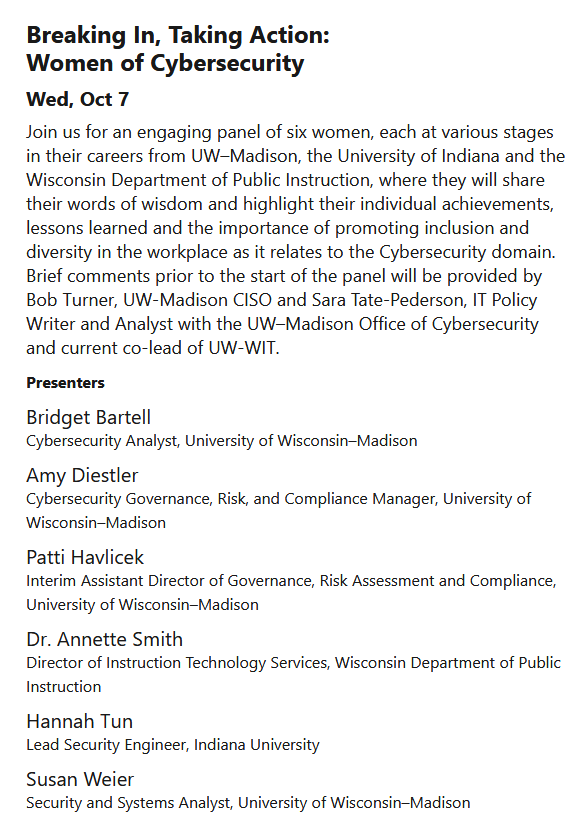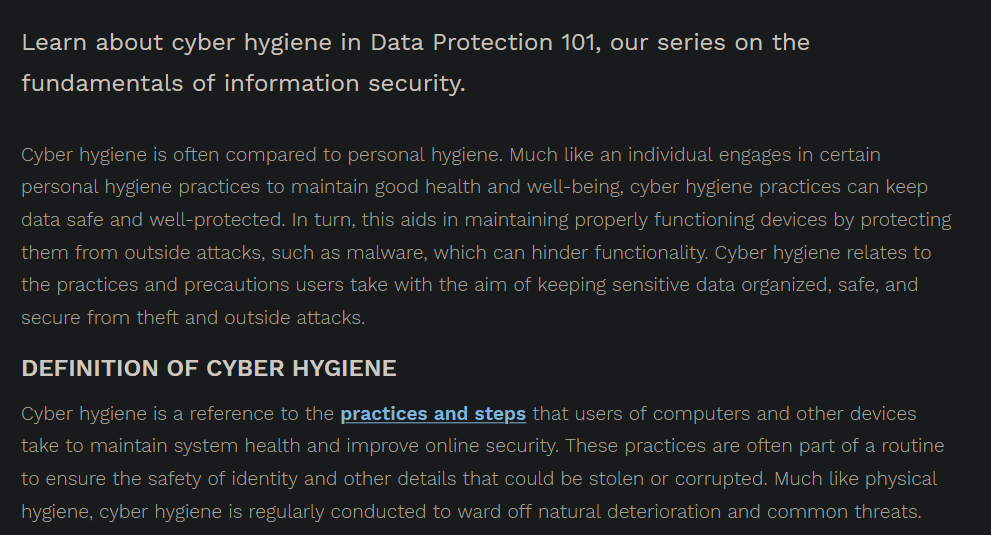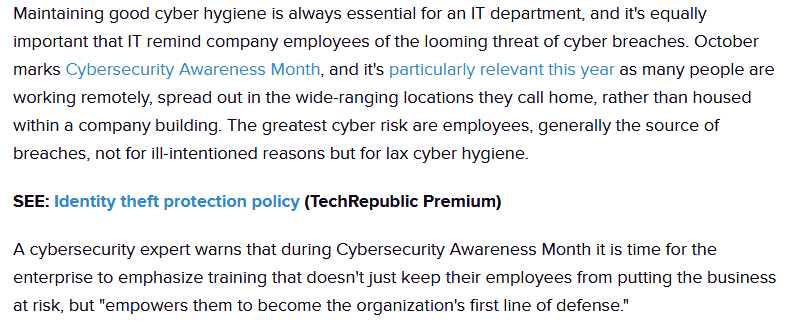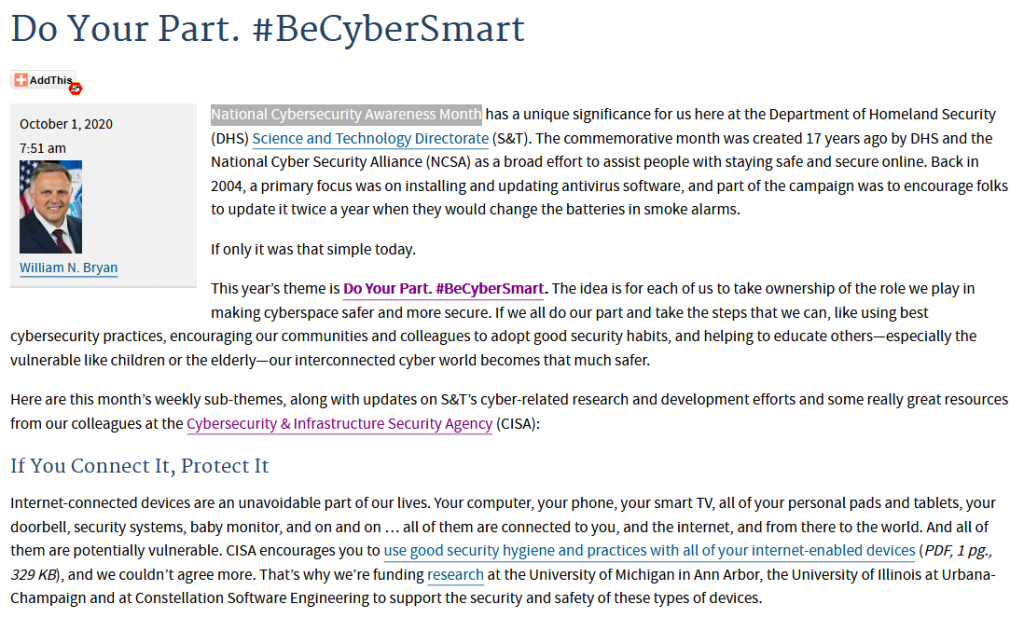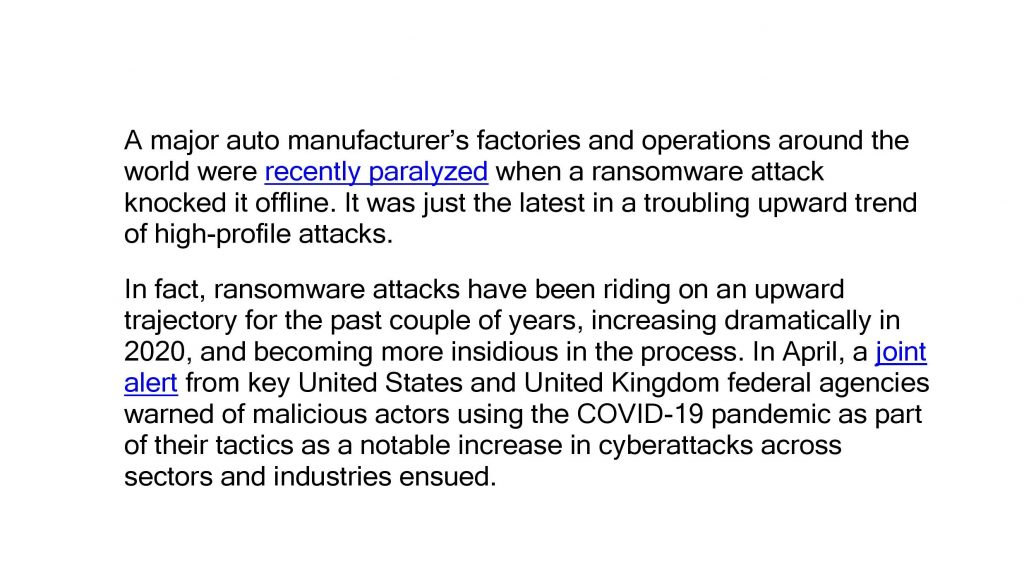by Lance Whitney in Security on October 6, 2020, 6:50 AM PST
Tag: cybersecurity
This October looks quite different from previous years, as IT oversees staff who are no longer centrally located, creating a larger attack surface for bad actors. Awareness is key, experts say.



Home Router Security
Do you work from home and use your home internet to perform work?
How secure are you?
Today we’ll talk about the router.
Do you have a router? Do you know where it is? Have you dusted it off this year?
A router is a must have when it comes to working from home. A router can help to keep you secure when you’re on the internet both for home use or if you’re accessing work related documents or work computers.
If you’re shopping for a router what should you look for? There’s a lot of information out there and depending on the number of devices in your home can help to determine what you need in a router.
Do you have children that use the internet? Make sure that whatever you have or purchase for a router has a guest network capability. A guest network can help separate work and home functions that use the same router. If you want to keep your work more secure than make sure that this is happening in your house. By keeping leisure devices on a separate guest network, you ensure that your work devices are safer.
Do you have home automation, home security, Smart devices, Smart tv’s, Tablets, gaming systems or cell phones? Make sure that they all connect to the guest network. If a cyber criminal would compromise any of these items, they could potentially compromise your work computer if they’re on the same network.
Does your router have a firewall and is it enabled? A firewall adds an additional layer of security to your home network. Most home use routers have built in security capable of providing different services to help you secure your network. A good router will have the capability to block sites from accessing your network and your computers on that network. A good router will also have parental controls that will allow you to control what your children have access to.
If you already own a router, is it updated? Depending on the manufacturer, they will provide firmware updates for your router. Just because your router works doesn’t mean it’s secure. If you happen to own an off-name brand router and the company no longer supports that device, you should upgrade to a more up to date router to ensure that you’re as safe as you can be on the internet. Some routers will actually offer automatic updates, if this is available in your router, enable it.
Router password security: Whether you currently own or are planning to purchase a router, you should make sure that the administrator user i.d. and password are changed from the factory default. Some manufacturers aren’t really secure out of the box and use a default of admin for the user and admin for the password. This isn’t too tough for criminals to figure out and is usually their first attempt at breaking into your router. Do the same thing for the Wi-Fi settings on your router. If a criminal is within Wi-Fi range they can log in and take over your router and any device attached. Change them and use a password that isn’t easily cracked. Repeat the process one more time for the guest network. When you name your Wi-Fi network and guest network (SSID) don’t use anything that will identify you or where you live.
Connecting to your router. If at all possible, connect using a cable versus the Wi-Fi, by connecting this way you eliminate one avenue of your computer becoming a victim.
VPN: Do you need a VPN? A Virtual Private Network (VPN) is a necessity if you’re working from home. Chances are that you’re connecting to work computers and work documents containing valuable information, sometimes personal data. By using a VPN you’ve just added an additional layer of security. There are manufacturers that offer VPN services directly through your router and can be setup accordingly.
Hours of activity: One of the easiest ways to minimize your internet security risk is to turn it off. If at all possible, turn your router off during hours of non-use. If your router isn’t on, it can’t be compromised. If you don’t have a need for it to be on, turn it off. If you go on vacation and your router isn’t needed turn it off.
Take inventory, most newer routers offer a way to log into your router, view and manage the devices connecting to your router. Some routers will actually allow you to give each device a name so you can easily identify the devices connecting to your router. If you don’t recognize it, remove it.
Get into a routine of managing your router. You should get into a regular habit of logging into your router and view your settings to ensure that you haven’t been compromised.
Other details of what you should look for in a router. These items aren’t necessarily security items, but might make the difference in what you need in a router. Check to see if either the router you own or are about to purchase has MU-MIMO (Multiple User Multiple Input – Multiple Output) If you have more than one device that connects to the internet through your router you should have this feature. Without Mu-MIMO it’s like have a traffic cop at the top of the on-ramp letting cars go onto the freeway one at a time, with Mu-MIMO you can have multiples accessing at the same time. Do you or your family members stream videos or play online games? If this is the case, you’ll want to look at Maximum download speed of the router. Movies and video games need a fast router the faster the speed the better performance. This will also enhance how well you access remote networks for work as well.
Price: How much should a good router cost? Depending on your needs the price can vary. Just using the scenario of having a couple of laptops and a Smart tv connecting to router, an average price router should cost between $100- $200. Yes, you can spend more, but do you need it? If you don’t do online gaming then probably not. There a lot of nice options on the market and shopping can be intimidating if you don’t know what you’re looking for.
Hopefully this article has got you thinking about your router and security needs. This article isn’t intended to be the only answer to your router questions. The objective of this article was to get you thinking, not put you to sleep. If you have questions feel free to contact us at [email protected].
Below is a link to our checklist



